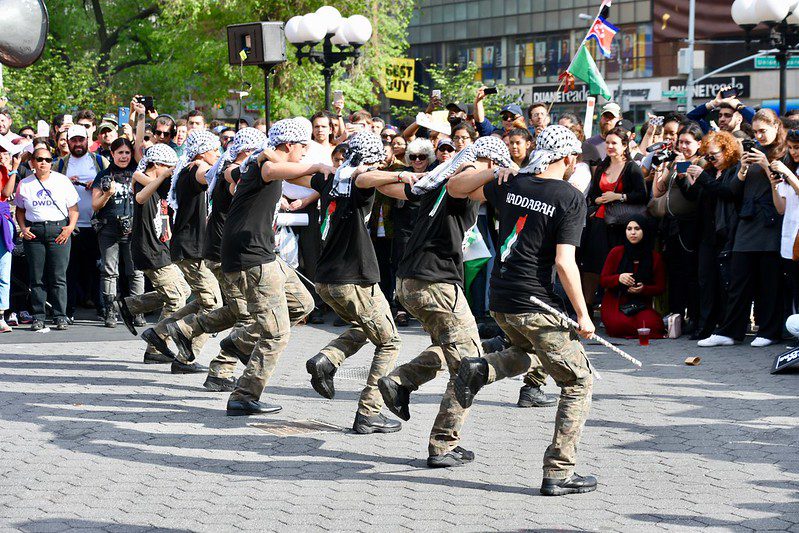Dabke is a traditional Palestinian dance that is often performed at weddings, parties and other gatherings. It’s been around for centuries, and it has played an important role in keeping Palestinian culture alive by helping to preserve it. Dabke involves energetic movements, hand clapping and foot stomping. It can be performed solo or in groups of dancers. Dancers move their bodies to the rhythm of the music in sync with one another. Dabke also requires coordination between individuals, which makes it even more challenging than individual dances like ballet or ballroom dancing. The fast-paced nature of dabke makes it interesting to watch as well as perform. Here are 4 ways in which dabke is keeping Palestinian culture alive:
Palestinians have a long and proud tradition of dance
Palestinian culture has a long and proud tradition of dance. However, after the creation of Israel in 1948, Palestinians were prohibited from practising many aspects of their culture. This included dance. In fact, this was a way that the Israelis used to try to erase Palestinian culture. Fortunately, dabke has survived. Many Palestinians used dabke as a way to secretly practice their culture. For example, some people danced dabke in their backyards while wearing normal clothes when they were supposed to be inside. It was also common to see dabke performed at weddings and other special occasions. This allowed Palestinians to keep their tradition alive despite immense pressure from the Israeli government.
Dabke helps to teach Palestinian history and culture
Dabke is often performed at weddings and other events to celebrate Palestinians’ history and culture. In fact, dabke is often performed at important events to mark the occasion through dance. For example, dabke is often performed at weddings as a way to celebrate the couple’s love for each other as well as their love for their culture. Dabke can also be performed to mark important dates in Palestinian history such as Land Day. This is a day of remembrance in which Palestinians commemorate the events of 1976 in which Israeli farmers protested against the Israeli government’s decision to expropriate their land. Dabke can also be used to teach Palestinian children about their culture and history. In fact, many schools in the Palestinian Territories have dabke classes in which students can learn about their culture while also getting a good workout. Palestinian youth can also learn about their culture and history by watching professionals perform dabke. This is helpful because it provides more insight than simply reading about the culture.
Dabke enables Palestinian youth to practice traditional fighting skills
The roots of dabke are actually in traditional fighting skills. Dabke was originally used as a way to train fighters for battle. Today, you can see some of these traditional fighting moves in performances of dabke. For example, performers often use swords and shields as part of their dances. Dabke is often performed at weddings as a way to show off traditional fighting skills. This can be done in two ways. First, swords and shields can be used in performances. Second, dancers can wear traditional clothing to showcase their skills as well as their heritage. In this way, dabke is used to show Palestinian youth how their ancestors used to fight. This enables Palestinian youth to keep their fighting skills alive and helps them to learn about their history.
Dabke can help preserve the Arabic language
Dabke is derived from the Levantine Arabic word dabaka دبكة meaning “stamping of the feet” or “to make a noise” Traditional Arabic culture and language are often performed at weddings and other events through the use of dabke. This can help to preserve the Arabic language. Traditions like this can help to preserve the Arabic language and keep it from being lost as time goes on. Dabke can also be performed with the use of poetry. Poetry is often used in traditional Arabic culture. For example, dabke is often performed to the sound of poetry. This can help to keep the Arabic language alive and well.
Conclusion
Dabke has been around for centuries, and it has played an important role in keeping Palestinian culture alive by helping to preserve it. Palestinians have a long and proud tradition of dance and dabke. It can be performed solo or in groups of dancers. Dabke also requires coordination between individuals, which makes it even more challenging than individual dances like ballet or ballroom dancing. The fast-paced nature of dabke makes it interesting to watch as well as perform. Dabke has helped to keep Palestinian culture alive by helping to preserve it. It has done this by teaching Palestinian youth about their history and culture, enabling them to practice traditional fighting skills and by helping to keep the Arabic language alive.
Image Credit: Alec Perkins/Flickr



















